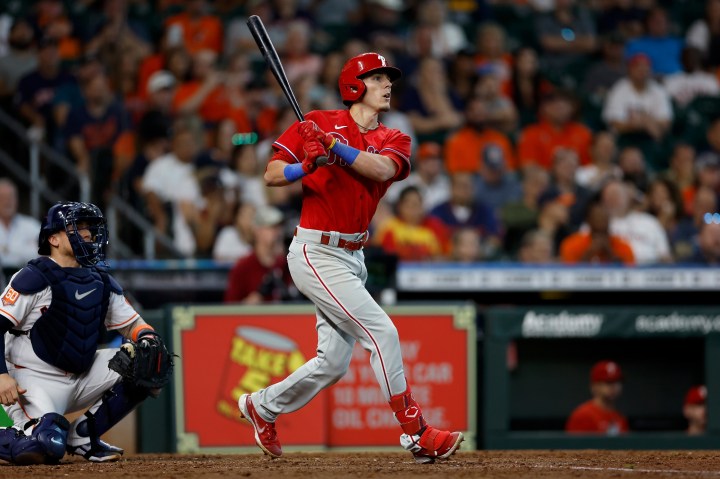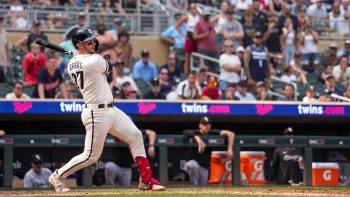
Why do baseball games have such weird start times?

This is just one of the stories from our “I’ve Always Wondered” series, where we tackle all of your questions about the world of business, no matter how big or small. Ever wondered if recycling is worth it? Or how store brands stack up against name brands? Check out more from the series here.
Listener and reader Greg Patt from Willoughby, Ohio, asks:
Why do baseball games start at 1:05 instead of 1:00? All the other sports seem to be OK with starting on the hour. [Editor’s note: The NFL also has unusual starting times, beginning 15 or 20 minutes after the hour.]
With the Houston Astros and the Philadelphia Phillies squaring off in the first game of the World Series tonight, you may have noticed something unusual about the game times. Instead of being scheduled for the top of the hour, playing is set to start at 8:03pm ET.
Baseball games are scheduled off-the-hour throughout the season, starting at any number of minutes after the hour in a way that seems oddly specific.
That’s because teams take into account factors like the logistics of broadcast television, and aim to give people enough time to get parked and enter the venue, according to a representative for Major League Baseball. The MLB said teams playing at home set their own game times, with the exception of certain special national games.
“Local regional sports networks come on the air at the top or bottom of the hour, do an opening segment, take a commercial break, and come back for first pitch. That usually takes a few minutes, so our game times factor in some of the realities of the television product,” according to the MLB spokesperson. “If a TV window starts at 7:00, a first pitch at 7:05 or 7:10 allows them to introduce the game.”
Pre-game festivities like the national anthem, lineup announcements and the ceremonial first pitch also contribute to delayed start times.
In sports, there’s a level of coordination between the TV broadcasters and venues that you could compare to “Mission Impossible,” according to Charles Scatterday, a professor in sports and adventure media at West Virginia University who worked for ESPN for almost 20 years. If you have a game at 7:03 p.m., you might begin the national anthem at 6:59 p.m. inside the venue. Meanwhile, on the air, broadcasters are busy welcoming viewers at home.
“It’s this orchestrated dance of coordination because the venue wants to entertain. The venue wants to do things that are proper and protocol,” Scatterday said.
In some instances, baseball teams have entered promotional deals with other companies that lead to fun, gimmicky start times.
Back in 2006, the White Sox began airing weeknight home games at 7:11 p.m. in a three-year agreement with 7-Eleven worth $500,000 a year.
“Every time the media announces the game’s start time it will be a gentle reminder of our sponsorship,” Margaret Chabris, a 7-Eleven spokesperson, told the Associated Press at the time.
But after the deal ended, 7-Eleven opted not to renew the contract because of a downswing in the economy, ESPN reported.
The history of baseball scheduling
Back in 1939, Gillette Razors paid $100,000 for the exclusive rights to broadcast the World Series on radio, working with the Mutual Broadcasting System, according to Jacob Pomrenke, the director of editorial content at the Society for American Baseball Research.
“Gillette demanded — and received — input on content, scheduling and even the announcers that Mutual hired to call the games,” Pomrenke said.
Since then, the influx of corporate money into the sport has continued to influence the game’s scheduling.
“Baseball’s business partners — corporate sponsors and TV networks — pay big money to dictate every minute of how the broadcast is scheduled, and today that includes the starting time of the first pitch,” he said.
Baseball start times have changed over the years, and it’s difficult to pinpoint the exact date for when off-the-hour scheduling became the norm. It’s the result of a convergence of factors that occurred as the game evolved over the decades.
“Baseball has always had an elaborate pre-game ceremony with the national anthem, the ceremonial first pitch, and recognizing members of the community,” Pomrenke said. “That’s always been part of baseball’s pre-game festivities. That’s really one of the bigger reasons why baseball has had shifting game times.”
Pomrenke said the concept of off-the-hour scheduling, or the type of baseball scheduling we’re familiar with now, became popularized after television executive Ted Turner, the founder of Cable News Network, purchased the Atlanta Braves in 1976. He aired their games at 7:05 p.m. or 7:35 p.m. on his cable superstation WTBS.
Prior to this time period, most teams listed their games on the hour or on the half hour.
“It was a way to differentiate his sports programming and also to provide his broadcasters with a three- to four-minute lead-in to preview the game before the first pitch was thrown,” Pomrenke said. “National playoff and World Series broadcasts soon began following suit in the 1980s and this has led to the strictly choreographed pre-game broadcasts that we see today.”
Pomrenke noted that Turner wasn’t the first person to do this, and other teams listed off-the-hour start times, too. But it became “a bit more noticeable” because of WTBS’ reach.
It was “a savvy PR move,” Pomrenke said.
Pomrenke also explained that when games were scheduled to begin at 7 p.m. or 8 p.m., it could take up to 20 minutes for the game to officially begin, angering TV networks, fans and players.
“Ceremonies were taking longer and longer to complete, so the game would not start at the time that it was scheduled to start,” he said.
How baseball stacks up to other sports
Like baseball, the NFL also starts some of its games off the hour (namely in the afternoon). So why does it work this way for these sports, when in basketball, NBA games are listed at being at the top or bottom of the hour?
Well, the NBA technically has later start times, too, explained Alex Kartman, an associate lecturer of media at Ball State University and a freelance technical director who works in sports television.
They just don’t list the start time of their “first pitch.” That is, their tip-off time.
Kartman, who works with the Pacers, said tip-off time is about eight minutes after the hour for regional broadcasters. (He noted that networks like ABC, ESPN and TNT might time the games differently.)
He said that Bally Sports Regional Networks and Root Sports are guaranteed two media breaks prior to tip-off happening.
This means that they can negotiate with their commercial partners to fill two to three minutes of commercials, twice, before tip-off, explained Kartman.
With NBA playoffs and finals, game times may start even later so that there’s more coverage of in-venue activities and lineup announcements. “[It’s] to help build up the game and the momentum on the television broadcast,” Kartman said.
So it turns out the real key difference between the MLB and a sports league like the NBA isn’t that it’s actually starting games later. It’s that it’s being more honest. “From my perspective as a media instructor, I find it fascinating and appealing that they are truthful to their audience in telling them exactly when first pitch will be,” Kartman said.
There’s a lot happening in the world. Through it all, Marketplace is here for you.
You rely on Marketplace to break down the world’s events and tell you how it affects you in a fact-based, approachable way. We rely on your financial support to keep making that possible.
Your donation today powers the independent journalism that you rely on. For just $5/month, you can help sustain Marketplace so we can keep reporting on the things that matter to you.


















